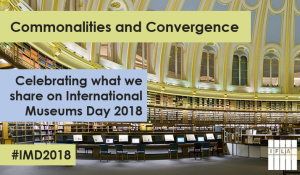
Adapted from British Museum Reading Room Panorama Feb 2006, CC-BY 2.5 Diliff https://bit.ly/2wQYIkL
‘Museums are an important means of cultural exchange, enrichment of cultures and development of mutual understanding, cooperation and peace among peoples’.
In its description of the core value of museums for International Museums Day, the International Council on Museums (ICOM) makes it easy to draw parallels with the work of libraries. Our institutions are far from just being storehouses, but are places where ideas, creativity and knowledge are accessed, shared, and applied.
As ICOM sets out, this contributes to understanding, cooperation and peace. IFLA’s own work underlines the contribution that heritage and information can make to building stronger, more cohesive societies, better able to achieve their development goals.
To celebrate International Museum Day, it seems fitting to look at what libraries and museums share, in their activities, in their values, and in the challenges they face.
Common Actions
It is hard enough even to develop comprehensive definitions of what libraries and museums are, and of course they hold highly varied collections. Yet in their core activities, there are key similarities, with acquisition, preservation, and access to works in the public interest.
The materials they are collecting, safeguarding and exhibiting may vary, with museums often focused on objects and artifacts and libraries on documentary heritage. Yet these all require both expertise and dedication, and a responsible and imaginative approach to engaging the public. And the subject of how we preserve our digital heritage is becoming increasingly pressing as the share of creativity and knowledge produced online grows.
Increasingly, both libraries and museums are exploring new possibilities for people to use their collections, both for research and creative purposes. The emergence of the digital humanities offers new possibilities to show the value of the materials held by our institutions, and inspire new works.
Common Values
Underlying these actions is a shared commitment to heritage, and understanding of the contribution it can make to broader societal goals. By collecting and giving access to ideas and innovations, they are an early manifestation of the sharing economy.
Both institutions helped break away from the old world of art and literature funded by, and reserved for, the elite. Libraries and museums are fundamentally democratic institutions.
Yet alongside this, there are important professional considerations concerning collections. Libraries and museums are conscious of the impact of the choices they make today, as well as of those made in the past.
In these choices, both libraries and museums require both independence (as set out in the recent ICOM statement, as well as in IFLA’s 1999 statement on Libraries and Intellectual Freedom), and strong attention to ethical principles. Both IFLA and ICOM have developed codes of ethics for use by their members.
Common Challenges
In a world where many people’s first instinct when looking for information or entertainment is to switch on their computer or phone, libraries and museums are both working increasingly through their websites. With the exception of the most high-profile institutions, the importance of the platforms that can host or at least bring collections together is growing.
These platforms come in different shapes and sizes. As well as those which are publicly or independently supported (such as Europeana or Wikipedia), the importance of commercial platforms such as Google (and even pirate sites) cannot be underestimated. There is value in thinking together about where there is experience to share, in order to ensure the public interest is protected and maximised.
Similarly, and topically with the upcoming meeting of the World Intellectual Property Organisation’s Standing Committee on Copyright and Related Rights (SCCR), the copyright challenges faced by libraries and museums (as well as archives) are also similar.
This is partly due to convergence in the digital world, but also the fact that the work of the institutions is often difficult to separate. As IFLA’s statement at the last SCCR meeting set out, ‘libraries and museums contain archival collections, museums and archives house libraries, and archives hold library and museum materials’.
In their work to preserve, organise, give access to and use cultural heritage, more harm than good comes from trying to treat these institutions separately.
So congratulations to friends and colleagues in the museums sector on the International Day of Museums, and here’s to more discussion, exchange and cooperation in the future!